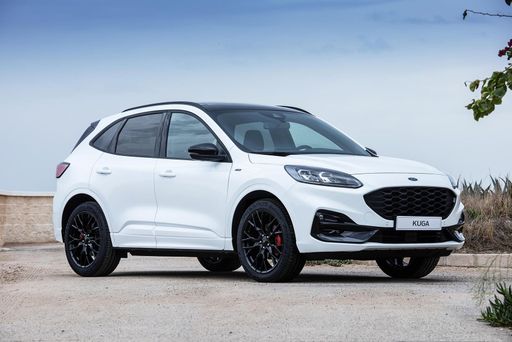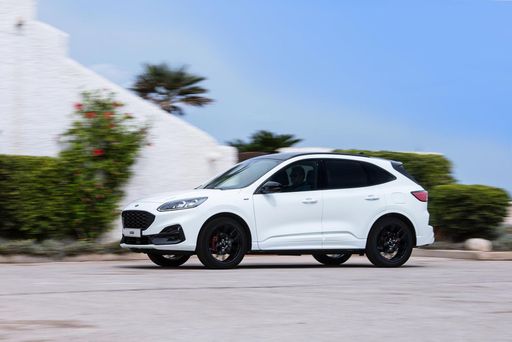The automotive market is teeming with options for SUV enthusiasts, but two contenders stand out: the Ford Kuga and the Hyundai Kona. Both vehicles bring a unique blend of style, performance, and innovation, making them popular choices for those seeking compact SUVs. In this article, we delve into a detailed comparison of the two to help you decide which one fits your driving needs better.
Ford Kuga vs Hyundai Kona - Differences and prices compared
Compare performance (243 HP vs 218 HP), boot space and price (34200 £ vs 23100 £ ) at a glance. Find out which car is the better choice for you – Ford Kuga or Hyundai Kona?
Powertrain Options and Performance
The Ford Kuga offers a diverse array of powertrain options, including petrol, full hybrid, and plug-in hybrid models. With power outputs ranging from 150 to 243 HP, the Kuga caters to those seeking efficiency and performance alike. The 2.5L hybrid versions achieve an impressive fuel consumption as low as 0.9 L/100km, making them exceptionally economical.
Meanwhile, the Hyundai Kona flaunts its versatility with petrol, hybrid, and fully electric variants. Power outputs vary from 100 to 218 HP, ensuring that there's a Kona model for every taste. Particularly noteworthy is the electric variant, capable of traveling up to 514 km on a full charge, showcasing Hyundai’s commitment to sustainable mobility.
Driving Experience and Handling
Both SUVs are equipped with front-wheel drive and all-wheel drive options, allowing drivers to choose based on personal preference or driving conditions. The Kuga’s acceleration times range from 7.3 to 9.5 seconds for the 0-100 km/h sprint, showcasing its sporty performance with the right engine choice.
The Kona edges slightly ahead in handling finesse, offering a slightly lower center of gravity and a well-tuned suspension. This makes for a nimble driving experience, particularly in urban environments where quick maneuverability is essential.
Interior and Comfort
In terms of interior quality, both the Kuga and the Kona cater to modern drivers with spacious, well-equipped cabins. The Kuga boasts a trunk capacity of 412 liters, while the Kona offers a slight advantage with 466 liters of cargo space. This makes the Kona a practical option for families or those needing extra storage for weekend adventures.
Both models feature a user-friendly infotainment system. The Kuga typically comes with Ford's SYNC system, which integrates seamlessly with smartphones, whereas the Kona features the latest Hyundai Touchscreen, renowned for its responsiveness and clarity.
Safety and Technology Innovations
Safety technology is paramount in both SUVs. The Ford Kuga is equipped with an extensive suite of safety features, including adaptive cruise control, lane-keeping assistance, and pre-collision assist, which is beneficial for peace of mind on long drives.
The Hyundai Kona doesn’t fall short either, featuring advanced safety technologies such as forward collision-avoidance assist and blind-spot monitoring. Its 2024 model year introduces improved driver aids that further heighten safety on the road.
Environmental Considerations
When it comes to eco-friendliness, the Kuga’s hybrid variants truly stand out. Offering lower CO2 emissions than many rivals, it achieves figures as low as 20 g/km in its plug-in hybrid configuration. This not only benefits the environment but also reduces running costs, making it an appealing option for eco-conscious buyers.
The Hyundai Kona’s electric version takes this a step further, with zero tailpipe emissions and an exemplary efficiency of 14.6 kWh/100km. This model firmly establishes Kona as a leader in the green automotive space.
Conclusion: Which One to Choose?
The choice between the Ford Kuga and Hyundai Kona ultimately boils down to individual preferences and needs. If you’re on the hunt for a versatile powertrain, plush interior space, and sporty performance, the Kuga may be your ideal choice. Alternatively, if you prioritize eco-friendliness, a compact size for urban driving, and advanced technology features, then the Kona could be the perfect fit.
With both vehicles offering compelling features and innovations, you can’t go wrong with either—the decision will reflect your unique driving lifestyle.
Here’s where it gets real: The technical differences in detail
Costs and Efficiency:
When it comes to price and running costs, the biggest differences usually appear. This is often where you see which car fits your budget better in the long run.
Hyundai Kona has a significantly advantage in terms of price – it starts at 23100 £ , while the Ford Kuga costs 34200 £ . That’s a price difference of around 11185 £.
Fuel consumption also shows a difference: Ford Kuga manages with 2.80 L and is therefore convincingly more efficient than the Hyundai Kona with 4.60 L. The difference is about 1.80 L per 100 km.
As for electric range, the Hyundai Kona performs convincingly better – achieving up to 514 km, about 446 km more than the Ford Kuga.
Engine and Performance:
Under the bonnet, it becomes clear which model is tuned for sportiness and which one takes the lead when you hit the accelerator.
When it comes to engine power, the Ford Kuga has a somewhat edge – offering 243 HP compared to 218 HP. That’s roughly 25 HP more horsepower.
In acceleration from 0 to 100 km/h, the Ford Kuga is hardly perceptible quicker – completing the sprint in 7.30 s, while the Hyundai Kona takes 7.80 s. That’s about 0.50 s faster.
In terms of top speed, the Hyundai Kona performs barely noticeable better – reaching 210 km/h, while the Ford Kuga tops out at 200 km/h. The difference is around 10 km/h.
There’s also a difference in torque: Hyundai Kona pulls hardly perceptible stronger with 265 Nm compared to 240 Nm. That’s about 25 Nm difference.
Space and Everyday Use:
Cabin size, boot volume and payload all play a role in everyday practicality. Here, comfort and flexibility make the difference.
Both vehicles offer seating for 5 people.
In curb weight, Hyundai Kona is to a small extent lighter – 1370 kg compared to 1526 kg. The difference is around 156 kg.
In terms of boot space, the Hyundai Kona offers a bit more room – 466 L compared to 412 L. That’s a difference of about 54 L.
In maximum load capacity, the Ford Kuga performs slightly better – up to 1534 L, which is about 234 L more than the Hyundai Kona.
When it comes to payload, Ford Kuga somewhat takes the win – 550 kg compared to 490 kg. That’s a difference of about 60 kg.
Who wins the race in the data check?
The Hyundai Kona holds a decisive overall lead in the objective data comparison.
This result only shows which model scores more points on paper – not which of the two cars feels right for you.
Costs and Consumption
View detailed analysis
Engine and Performance
View detailed analysis
Dimensions and Body
View detailed analysis

Hyundai Kona
Ford Kuga
The Kuga is Ford’s adaptable family SUV that blends usable space with a surprisingly lively driving character, making daily commutes and weekend escapes equally enjoyable. With smart interior packaging, an easy-to-use infotainment setup and composed road manners, it’s a sensible choice for buyers who want a bit of fun without the fuss.
details


Hyundai Kona
The Hyundai Kona wears its personality on the outside with bold styling and sprightly handling that turns city driving into something a little more fun than a commute. It blends practical space, modern tech and sensible running costs into a compact, stylish package — a smart pick if you want flair without paying luxury prices.
details



Costs and Consumption |
|
|---|---|
|
Price
34200 - 46300 £
|
Price
23100 - 41600 £
|
|
Consumption L/100km
2.8 - 6.8 L
|
Consumption L/100km
4.6 - 7 L
|
|
Consumption kWh/100km
-
|
Consumption kWh/100km
14.6 - 16.8 kWh
|
|
Electric Range
68 km
|
Electric Range
377 - 514 km
|
|
Battery Capacity
1.1 - 14.4 kWh
|
Battery Capacity
1.3 - 65.4 kWh
|
|
co2
55 - 154 g/km
|
co2
0 - 163 g/km
|
|
Fuel tank capacity
42 - 54 L
|
Fuel tank capacity
38 - 47 L
|
Dimensions and Body |
|
|---|---|
|
Body Type
SUV
|
Body Type
SUV
|
|
Seats
5
|
Seats
5
|
|
Doors
5
|
Doors
5
|
|
Curb weight
1526 - 1859 kg
|
Curb weight
1370 - 1773 kg
|
|
Trunk capacity
412 L
|
Trunk capacity
466 L
|
|
Length
4604 - 4645 mm
|
Length
4350 - 4385 mm
|
|
Width
1882 mm
|
Width
1825 mm
|
|
Height
1673 - 1681 mm
|
Height
1580 - 1585 mm
|
|
Max trunk capacity
1534 L
|
Max trunk capacity
1300 L
|
|
Payload
541 - 550 kg
|
Payload
420 - 490 kg
|
Engine and Performance |
|
|---|---|
|
Engine Type
Petrol, Full Hybrid, Plugin Hybrid
|
Engine Type
Electric, Petrol, Full Hybrid
|
|
Transmission
Manuel, Automatic
|
Transmission
Automatic, Manuel
|
|
Transmission Detail
Manual Gearbox, CVT, Automatic Gearbox
|
Transmission Detail
Reduction Gearbox, Manual Gearbox, Dual-Clutch Automatic
|
|
Drive Type
Front-Wheel Drive, All-Wheel Drive
|
Drive Type
Front-Wheel Drive, All-Wheel Drive
|
|
Power HP
150 - 243 HP
|
Power HP
115 - 218 HP
|
|
Acceleration 0-100km/h
7.3 - 9.9 s
|
Acceleration 0-100km/h
7.8 - 11.9 s
|
|
Max Speed
195 - 200 km/h
|
Max Speed
162 - 210 km/h
|
|
Torque
240 Nm
|
Torque
200 - 265 Nm
|
|
Number of Cylinders
3 - 4
|
Number of Cylinders
3 - 4
|
|
Power kW
111 - 178 kW
|
Power kW
85 - 160 kW
|
|
Engine capacity
1496 - 2488 cm3
|
Engine capacity
998 - 1598 cm3
|
General |
|
|---|---|
|
Model Year
2025
|
Model Year
2024 - 2025
|
|
CO2 Efficiency Class
E, D, B
|
CO2 Efficiency Class
A, D, C, E, F
|
|
Brand
Ford
|
Brand
Hyundai
|
What drivetrain options does the Ford Kuga have?
The Ford Kuga is available as Front-Wheel Drive or All-Wheel Drive.
